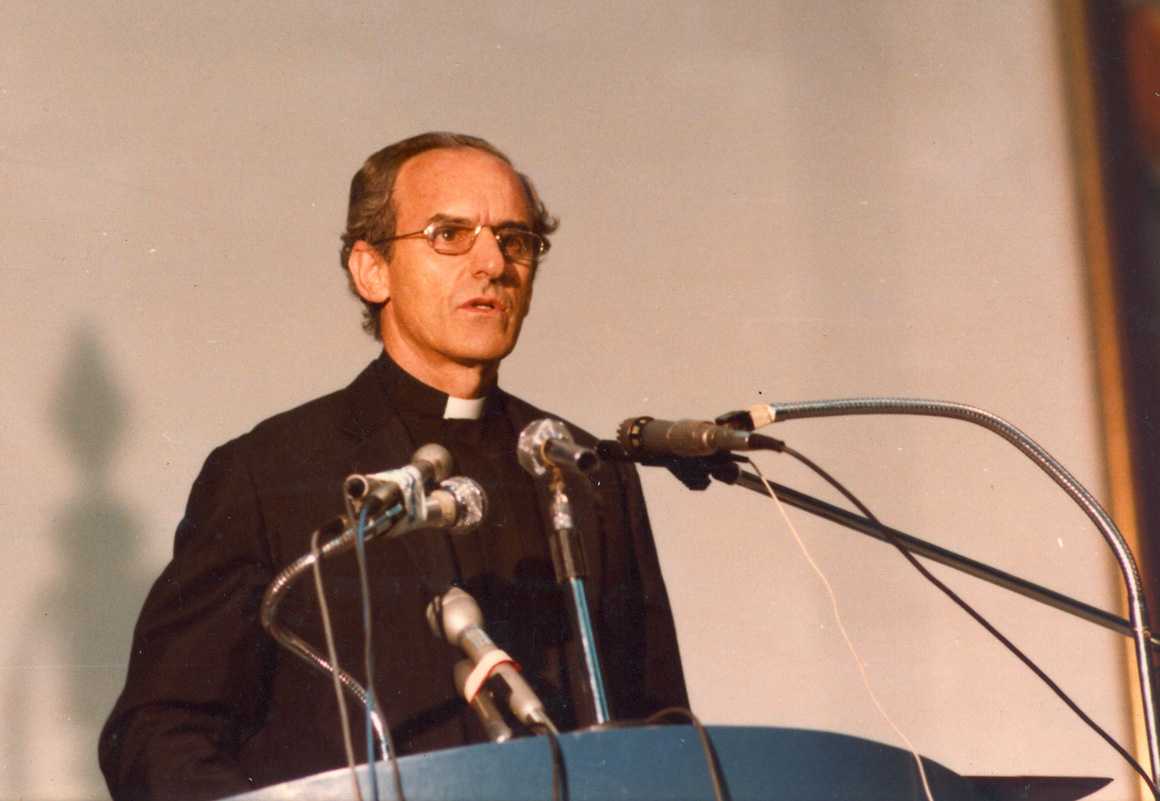In the early hours of the morning on November 16, 1989, three hundred Salvadoran soldiers circled the campus of the Society of Jesus’s Central American University (UCA) in El Salvador. A smaller dispatch proceeded to the Jesuit residence, where they murdered six Catholic priests execution-style on their front lawn and molested and shot the Jesuits’ housekeeper, Elba, and her daughter, Celina.
The horrific event raises a crucial question: Why did the Salvadoran military assassinate these religious leaders and their collaborators?
There is a short answer and a long answer to this question. The short answer is that the military had identified these Jesuit priests, especially Ignacio Ellacuría, SJ, the president of the UCA, as “the ringleaders of [the] subversive movements” and “the real brains” behind the leftist Farabundo Martí National Liberation Front (FMLN), which was opposing the reigning right-wing Nationalist Republican Alliance (ARENA) during the Salvadoran Civil War from 1979 to 1992. Essentially, the military labeled the Jesuits of the UCA “communists” to justify their extermination.
But I would like to provide a longer answer to this question by addressing a taboo issue in many contemporary discussions of the Jesuit martyrs of the UCA. Was Ignacio Ellacuría a communist? If not, was Ellacuría, as the military claimed, an ideologue of subversion?
To this first question, the answer is “no”–but with an important asterisk. Ellacuría was not a communist. Rather, he was a critic of communism on the basis of the problems of its historical practice. In his influential essay in the tradition of liberation theology, “Utopia and Prophecy in Latin America,” the martyr notes that “larger socialist nations,” likely thinking of the Soviet Union and China, have had to adopt “procedures more proper to the opposing [capitalist] system.” He claims that this fact exposes “certain limitations that well deserve to be considered.” When actually existing socialist countries take two steps forwards towards communism only to take one step back towards capitalism, they illustrate communism’s feasibility problem. Further, Ellacuría observes that “the Cuban model…has intrinsic difficulties that can be overcome only with a massive external support,” a truth that bears out in the significant challenges that Cuba has faced since the downfall of the Soviet Union. Ellacuría summarizes, “There are…serious problems in the realization of the socialist model as the most effective instrument to historicize Christian utopia.”
The Jesuit was not only concerned about communism’s inability to sustain itself in history. He also problematized communism’s material reductionism and exaggerated consequentialism. He held that Christian utopia, a project transcending any dogmatic Marxist model, was the ultimate goal of humanity and that Christianity could help correct Marxism’s unhelpful tendency towards “reductionisms” and “effectivisms.” Like his fellow liberation theologians, Ellacuría regularly insisted that the liberationist theory of just social change was at once historical and open to grace, to the beyond, and to God. The communist theory of just social change qua materialism and atheism was not, these absolutes being significant limitations to communism’s praxis and compatibility with Christianity.
It’s evident that the UCA president’s writings exhibit a critical distance from communism, especially in its actually existing forms, and, as such, the military was wrong to draw a solid line from Engels to Ellacuría.
I will contend, however, that there is a dotted line connecting Marx’s political economy to Ellacuría’s. Though not a communist, the Jesuit philosopher was a subversive. He minced no words in his critique of capitalism and its imperialist developments, and he acknowledged that Marxism was a useful tool to diagnose and overcome the ills of the free market economy. For example, in the same essay in which he identifies the problems with socialism mentioned above, he offers a ringing endorsement of Marxism’s utility, “Marxism, insofar as it is the great contradictor of [the capitalist arrangement], insofar as it profoundly attacks the spirit of capitalism and analyzes the mechanisms that sustain it, and insofar as it utopianly proclaims the liberation of human beings through the liberation of the poor, plays a long-reaching prophetic and utopian role in Latin America and offers a scientific method for unraveling the profound dynamisms of the capitalist system.” This view is subversive, indeed. Historically and concretely, unraveling capitalism meant unraveling ARENA and its antecedents, and unraveling ARENA meant sharing a goal with the FMLN.
Ellacuría openly and emphatically emphasized this subversive dimension of the Christian faith. He claimed that Latin America is searching for “revolutionary change rather than reformist change” and that Christianity exhibits a “subversive dynamism,” which, though running the risk of Marxist co-option, can propel revolution against “the demands of capital.” The question, Ellacuría thought, is not “if revolution is needed or not, but what revolution is needed and how to bring it about.” Ellacuría was an anti-capitalist revolutionary intellectual.
Though he did not identify as a Marxist, he did contend that under present circumstances in Latin America “the socialist ideal appears more connatural to the profound inspiration of the Christian message than the capitalist ideal, although neither of them is identified with the Christian utopian ideal.” He consistently refused to endorse communism wholesale, but he consistently expressed his preference for communism over capitalism given the “extreme poverty and oppression” that El Salvador and countries in similar environments have faced.
Philosophy and theology were Ellacuría’s disciplines, and he approached them with unparalleled intellectual rigor. Nevertheless, Ellacuría did not refrain from addressing the concrete economic and political questions of his day. He did not stay at the level of abstractions. He weighed in on specific matters of state. He took stands on policy, something that many university presidents then and today would consider inappropriate or polarizing. Neutrality was not his guiding light. He advocated in his theoretical essays for the historicity of Christian salvation and the integral political aspect of salvation, and these essays were not merely words on a page: he lived them. His insistence on denouncing specific injustices and announcing specific visions of justice upset the authorities that were to orchestrate his death.
The Jesuit knew that this way of proceeding would put a target on his head in the same way that Jesus knew that his preaching about blessings to the poor and woe to the rich would lead to his crucifixion. Many years before his assassination, Ellacuría would preach the following words to his fellow Jesuits on retreat: “We are in the same situation [as Christ was]… [And] what is it they will say to us priests or Jesuits when we dedicate ourselves to this task? First of all [they will say] … ‘these priests are communists or Marxists.’” That’s precisely what happened. Shortly after the 1989 murders, “A military sound truck from the First Infantry Brigade circulated in the neighborhood of the bishop’s headquarters announcing triumphantly, ‘Ellacuría and Martín Baró have fallen. We are going to continue killing communists.’” Prophetic imitation of Christ comes at the cost of defamation and death.
A clear example of Ellacuría’s repeated denunciations of capitalism’s specific discontents occurred as early as 1975-76 when the Salvadoran Legislative Assembly created the progressive Salvadoran Institute for Agrarian Transformation, which, in turn, announced its first project involving the redistribution of land from wealthy owners to peasant associations. The UCA publicly supported this plan. However, shortly after the institute’s creation and promulgation of its agenda, capitalist interest groups like the National Private Business Association lobbied successfully to limit the institute’s mandate and, consequently, its redistribution program. Just as the UCA had advocated for the original program, the UCA denounced the moderating revisionist program. In a significant editorial called “A sus órdenes, mi capital” (“At your orders, my capital”), a play on words highlighting the connection among the political apparatus, the military apparatus, and the capitalist mode of production, Ellacuría called the offensive against the original plan a clear instance of “class struggle.” In fact, the term “class struggle” appears in bold letters three times in three successive paragraphs. The Jesuit left no room for equivocation: agrarian reform was a matter of class struggle, and the “dictatorship of the bourgeoisie” was winning.
Ellacuría anticipated in the article the accusations of “Marxism-Leninism” that his detractors would no doubt hurl at him upon its publication: “Class struggle is not an exclusive, artificial, and willfully promoted instrument of Marxism-Leninism. The existence of classes is an objective fact–as is class struggle.” This defense exemplifies Ellacuría’s praxic line. He avoided restrictive identifications with prescribed tendencies, but he acknowledged that the vocabulary of his present argument coincided with that of Marxist analysis. The coincidence is not a matter of affiliation with Marxism but a result of two observers of reality, Marx and Ellacuría himself, arriving at similar descriptions of that reality due to an objective state of affairs to which the debate on agrarian reform points.
The editorial confirms an interpretation of Ellacuría’s life and death worthy of contemplation on the 32nd anniversary of his death. Though the martyr was not a communist as many of his assassins claimed, he did share some critical interpretations of social reality with communists. On the other hand, though many moderate commentators on Ellacuría’s thought wish to purge him of his revolutionary tendencies, he was a subversive intellectual who sought to unravel the dominant capitalist system that had created and reproduced harsh poverty in El Salvador.
The oppression that Ellacuría addressed in his writings and actions remain. In some ways, it has only intensified as economic inequities within and between nations continue to grow. These realities alongside the prophetic life of Ellacuría bring up a challenging question for Christians who seek to untie the chains that the global capitalist system has manufactured: Will we do justice to the memory of the UCA martyrs? Will we expose the orders that capital continues to give to politicians and military personnel? Will we work to subvert unjust systems even if it means putting our reputations, careers, and lives at risk?
Photo courtesy of Universidad Centroamericana José Simeón Cañas


